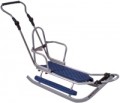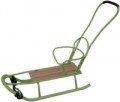The maximum load allowed for this model, in other words, the maximum weight that the sled can carry without consequences. It is highly undesirable to exceed this load: even if the structure does not break immediately, it can happen at any time, and with a high probability — at speed. And ideally, it is desirable to have a weight margin of at least 10-15 kg — this will give an additional guarantee in case of unforeseen situations.
The main material used in the construction of sleds.
Modern sleds can be made from one material (plastic, metal, wood) or from several - usually
metal with wood or
metal with plastic. Here's a more detailed description of each option:
-
Plastic. Plastic has a low price, weighs less and is “cooler” than metal, its properties allow sleds to be given a variety of shapes and colors, and the strength is quite sufficient for most cases. This has made it one of the most popular materials for all types of modern sleds. At the same time, inexpensive plastic models have low impact resistance and are prone to cracking, especially in severe frost.
-
Tree. Wood is the most pleasant to the touch in cold weather and looks good, but making an all-wood sled involves certain difficulties, from giving the runners the desired shape to special processing to achieve the necessary strength. Therefore, such sleds are very rare and mostly belong to the premium class; much more often wood is used in combination with metal (see below).
-
Metal. The main advantage of metal is its strength - the greatest among all materials for modern sleds: it can easily withstand heavy loads and almost does not lose its properties in the cold. At the same time, metal has a lot of weight and very “colds” hands
...and other parts of the body when touched in the cold (even freezing if touched with bare hands). Therefore, all-metal sleds are very rare, and even there the seat is made of fabric - usually metal is combined with other materials (see below).
— Metal/wood. In such sleds, the runners and frame are usually made of metal, and the seat is made of wood (most often from wooden slats). This allows you to combine the advantages of both materials at a low cost: metal gives the structure the necessary strength, and wood provides comfort to the rider, because It's much less cold.
— Metal/plastic. The structures are completely similar to the metal-wood ones (see above), with the same basic features, only the wood in this case is replaced by plastic.
